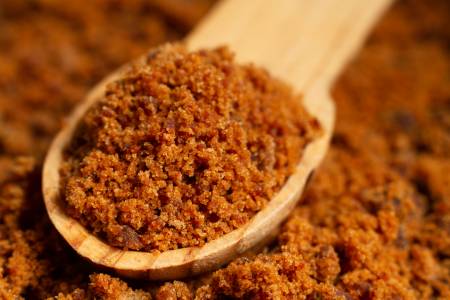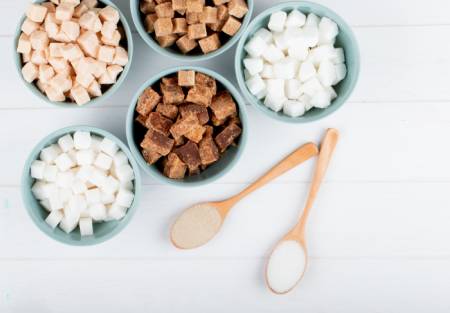Discover the Rich Flavors and Nutritional Benefits of Muscovado Sugar
Muscovado sugar, also known as “unrefined cane sugar,” is a type of brown sugar that is made from the juice of freshly harvested sugar cane. It is produced by boiling the juice until it becomes a syrup, and then allowing the syrup to crystallize and dry.
Unlike refined white sugar, muscovado sugar retains much of its natural molasses content, which gives it a rich, caramel-like flavor and a moist, sticky texture. It is often used in baking, as it can add depth and complexity to the flavor of baked goods. It is also sometimes used as a natural sweetener in drinks and other recipes.
One of the key differences between muscovado sugar and refined white sugar is the production process. White sugar is typically made by refining raw sugar cane juice and removing impurities, while muscovado sugar is made by simply boiling the juice until it crystallizes. This results in a sugar that is less processed and retains more of its natural nutrients, such as minerals and vitamins.
However, muscovado sugar is also higher in calories and glycemic index than white sugar, so it may not be suitable for those who are trying to watch their sugar intake or blood sugar levels. It is also important to note that muscovado sugar is not the same as raw sugar, which is made by drying the juice of sugar cane without boiling it.
Overall, muscovado sugar is a flavorful and natural alternative to refined white sugar that can be used in a variety of recipes to add depth and complexity to the flavor. It is worth considering for those who are looking for a less processed sugar option.

What is muscovado?
Muscovado sugar – also called Barbados sugar, khandsari or khand – is one of the least refined sugars available.
The brown syrupy liquid (molasses) produced during the cooking process remains in the final product, resulting in a moist, dark brown sugar with the texture of wet sand.
The high level of molasses also gives the sugar a complex flavor – with hints of butterscotch and a slightly bitter aftertaste.
Some companies that make muscovado remove a small amount of molasses to create a lighter variety. Muscovado contains magnesium, potassium, calcium and iron due to its molasses content.
Read more about magnesium, calcium and iron
The molasses in muscovado also contains some antioxidants, including gallic acid and other polyphenols, which help prevent cell damage caused by unstable molecules called free radicals
Free radical damage has been linked to chronic diseases such as heart disease and diabetes, so eating foods that contain antioxidants is good for your health.
The number one producer of muscovado is India.
Eating too much sugar has been linked to the development of cardiovascular disease and diabetes. The American Heart Association recommends no more than 25 grams of added sugar per day for women and 37.5 grams per day for men.
However, some researchers argue that because many people consume large amounts of white sugar, replacing it with natural brown sugar, such as muscovado, may improve the nutritional content of their diet.

Difference from other types of sugar
Difference from other types of sugar
- Granulated sugar
Granulated sugar is also known as table sugar or white sugar.
White sugar is produced similar to muscovado sugar, except that machines are used to speed up production and the molasses is completely removed by centrifuging the sugar
The result is white sugar with a texture similar to dry sand, which is very resistant to clumping.
Because granulated sugar contains no molasses, it has a neutral sweet taste and no color. It contains no minerals, which makes it less nutritious than muscovado sugar. - Brown sugar
Brown sugar is simply white sugar with molasses added back after processing.
Light brown sugar contains a small amount of molasses, while dark brown sugar contains more. However, brown sugar generally contains less molasses than muscovado sugar.
Like muscovado sugar, brown sugar has the texture of moist sand – but with a milder caramel flavor. - Turbinado and demerara sugar
Turbinado sugar and demerara sugar are also made from condensed cane juice, but are spun for a shorter time so that not all the molasses is removed.
Both have large light brown crystals and a drier texture than muscovado sugar.
These coarse sugars are most often used to sweeten warm drinks such as coffee or tea, or they are sprinkled on baked goods for extra texture and sweetness. - Jaggery, rapadura, paneer, kokuto, and sucanat
Jaggery, rapadura, paneer, kokuto and sucanat are unrefined, molasses-containing cane sugars that are very similar to muscovado. - Sucanat is a brand name for unrefined cane sugar.
Production methods can vary from manufacturer to manufacturer. For example, paneer is often sold as solid blocks, and rapadura is often sifted through a sieve to create loose granular sugar.
To summarize
Muscovado sugar – also called Barbados sugar, khandsari or khand – is an unrefined cane sugar that still contains molasses, giving it a dark brown color and the texture of wet sand.
It is most similar to other unrefined cane sugars such as jaggery and paneer, but brown sugar can also be used as a substitute.
Muscovado adds a caramel flavor to baked goods, marinades, glazes and even warm drinks such as coffee. Although muscovado is less refined than white sugar, it should be consumed in moderation to keep sugar intake to a minimum.
